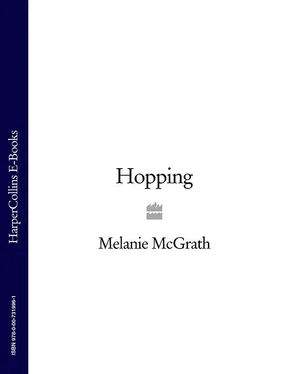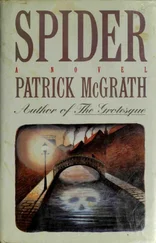All right, all right, there, there .
You said to stay still as the clock , Franny said sulkily. You said it , but the clock moved .
Daisy nodded. Franny was right. What had happened was her fault. It was all her fault. She returned to the clearing up. It very soon became clear that most of the flowers, the silk scraps and ribbon were ruined and the laundry was dotted about with blooms of transferred dye. Daisy dreaded her mother’s return.
When Elsie saw the mess she screamed so loudly that Mrs Shaunessy came rushing round, thinking she was being attacked, and after she left, Elsie pounded and thumped Daisy so hard that her breath came in rasps as if from an old kettle.
I wish the Sandeman would come and take yer. I wish he would , Elsie raged. ’Cause you ain’t no good to me, yer blue-arsed little weakling with yer elephant ears. I wish you’d never been born. I wish the Sandeman would take yer right now so that I wouldn’t ever have to trouble me eyes with you again .
As she swore and rampaged about, Franny sat at the table, perfectly still, with a little smile playing on her face.
What Daisy did not know and could not know then was how far and with what shocking speed this event would tumble into another, and another and another, until only the thinnest barrier, as fragile as eggshell, separated the Crommelin household from catastrophe. She did not know this because she did not consider her family to be poor – hadn’t Elsie always said they were respectable? – and because she had no notion yet of how vulnerable they were, and because she had not been alive long enough to understand the relentless cruelty of the East End tides, which daily washed in the hopeful and the desperate and daily dashed their hopes. She did not know, yet, what Joe Crommelin knew and had not thought to tell her, because she was not a boy, that to survive you had to steer your course mid-stream, where the water was deepest and ran fastest, that you had to paddle fast, as fast as you could, to stay there, to stay still in the rushing current, because the price of failure was to be washed up on the beach or be dashed to pieces on the wharves.
On Friday, Daisy walked alone to Leitkov’s, but instead of the usual boxes of jaunty irises and delicate roses, she carried the Kentish willow basket with what remained of the scraps. Listening to her story, the milliner sat impassively for a while, then reached for his account book and started totting up figures in his head. Eventually he said:
Tell your mother she owes me eight shillings and sixpence and there’ll be no more work till she’s paid it. I’ll be sending my man around every Friday to collect two and six. Tell her that .
Daisy returned home with the news. She sensed that, from now on, Friday evenings would never be the same.
For a while, Elsie struggled to pay back the money she owed Leitkov. She took in more laundry and kept Daisy back from school to help her with it and for days together the scullery reeked of carbolic and borax and Mrs Anderson complained that the plashing sound of the dolly peg and the rhythmic scraping of the washboard disturbed her sleep, but they never seemed to be able to make enough to pay off the collector when he came on a Friday. The experience seemed at once both to harden Daisy’s mother and render her more fragile, as though she’d been fired in a kiln at the wrong temperature. Elsie began to look around for things to hock. The first thing to go was the mantelpiece clock, then after that the china Elsie had been given as a wedding present by the woman in whose house she had worked as a maid. Next was Elsie’s overcoat, then Daisy’s, followed by some bed blankets. On Monday mornings it was now Daisy’s job to fill the cart that had once contained silk flowers with blankets and coats and set off for the pawnbroker, and as she walked by Helen Reid with her half-caste son, past the Greenbergs, it seemed that all that lay between them and The Deep were a few front doors.
Not long into the New Year, Elsie stopped eating, and at the same time she took up cleaning and polishing and scrubbing and bleaching and sweeping with more vigour than ever, and often at the oddest times. It was nothing to find her whitening the step at six in the morning, or hunched over her scrubbing brush in the middle of the night. When he got home from work in the evenings, Joe tried to comfort her, but she beat him off with her fists, and told him he could bugger off and take his bloody children with him . He began to spend more and more time in the pub after that.
The spring of 1914 arrived and patriotic flags began to appear in the shops. In May 1914 Joe came home with the news that the dockers had refused to handle German cargo and Mrs Shaunessy reported that Burrelli’s paint factory, where Mr Shaunessy worked, had dismissed all its German workers. By early summer, the more usual advertisements for flu powders and meat tea pasted on to Poplar’s billboards began to be replaced by recruitment posters and men in uniform were seen outside the East End’s pubs and cafés. Billy Shaunessy started catapulting boys and girls in the street and shouting:
Halt, friend or foe?
By late summer, columns of men had begun marching up and down the East India Dock Road most days, and queues of men gathered at the recruiting station in Poplar High Street, waiting to volunteer for the standard six-month tour of duty which was how long everyone was saying it would take to defeat the Hun. It was said that one fifth of those signing up were of German descent, keen to prove their patriotism or maybe to save their skins, for German butchers were having their windows smashed and anyone with a German name was in danger not just of losing his job but of being set upon in the street. At Culloden Street School Old Pigswill introduced an air-raid drill and taught potted histories of the calumnies of the Boche. In early September a sign went up at the general store around the corner offering credit for volunteer families only . The following day a great oval-shaped cloud floated across Poplar and in class Old Pigswill explained that airships would help defeat the enemy. Later that week a policeman rode by on a bicycle shouting Take cover! and sirens sounded and Daisy returned home at lunchtime to find her mother locked in the understairs cupboard shouting Give me back my twinnies! with Mrs Anderson rapping on the cupboard door and threatening to fetch Joe and the police and the doctor all at once. That night Daisy heard Joe and Mrs Shaunessy talking about her mother in hushed tones, Mrs Shaunessy every now and then clicking her tongue against her teeth, as though she were measuring the march of the Sandeman, advancing toward them.
Later that week Daisy returned home from school to find Mrs Anderson cooking faggots in the scullery.
Your mother’s gone for a little rest, poor duck , said Mrs Anderson. But never you worry, Mrs Shaunessy’s going to be taking you and yer sister on a nice long trip to the countryside .
CHAPTER 2
Mrs Shaunessy trudged forward in the gloom before dawn, trundling her hop box on a borrowed barrow. For the past three months she’d been stashing away the odd jar of Bovril, a sugar cube or two and a few packets of flour in the box that Paddy Shaunessy had fashioned from an old tea chest, and the night before she’d filled it with a bucket, a tea towel, a scrubbing brush and other domestic paraphernalia. Behind her Daisy pushed a pram containing Franny, who, at four, was far too big for the lacy bonnet Mrs Shaunessy had insisted that she wear as a kind of disguise (for what purpose she would discover later), and a half-dozen tins of corned beef. Billy Shaunessy trailed behind with a Union Jack sticking out of his pocket. Ever since Mr Shaunessy had signed up, Mrs Shaunessy considered it a matter of filial duty that Billy demonstrate the family’s patriotism at every opportunity, and the flag was intended for this purpose. Whenever men in uniform passed, heading towards the docks, Mrs Shaunessy would turn her head and say:
Читать дальше












